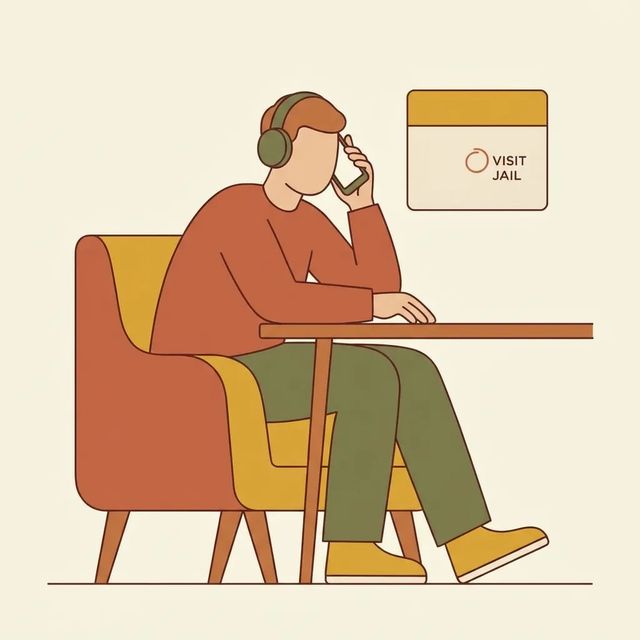TDCJ - Polunsky Unit
Explore
Find an Inmate at TDCJ - Polunsky Unit
Search for a loved one and send messages and photos in minutes.

Guides for This Facility

How to Contact an Inmate at Polunsky Unit (OK)
Reaching someone at Polunsky Unit usually involves two things: scheduling a visit and setting up phone access. Here are the details that matter most, plus what to confirm before you make plans.
Read Guide
How to Send Money to Polunsky Unit (OK)
Getting money into someone's trust fund is usually straightforward once you pick the right deposit method and confirm you're eligible to send.
Read Guide
How to Create a TDCJ Visitation Scheduler Account (Polunsky visitors)
Before you can schedule a visit at the Polunsky Unit, you need your own TDCJ Online Visitation Scheduler account. Here's how to create one, verify it, and troubleshoot the most common issues.
Read GuideAt a Glance
Visitation
- You must create your own TDCJ visitation scheduler account and complete the Background Questionnaire; TDCJ staff cannot create visitor accounts for you.
- Account registration sends a 7‑digit validation code to the email you provide, and once an account is created the email address cannot be changed or the account deleted.
- Visiting normally occurs Saturday and Sunday from 8:00 a.m. to 5:30 p.m., with a regular visiting period lasting two hours once inmate and visitor(s) are present.
Communication
- Call recipients must register their telephone number at texasprisonphone.com and provide the inmate's TDCJ ID before receiving calls.
- The scheduler lists visit types including Regular, Contact, and Video/Tablet (Video/Tablet is noted as different from the Securus Video program).
- Account creation requires submitting an email address that triggers an email containing a 7‑digit validation code and link to complete registration.
Sending Money
- Accepted deposit methods include money orders/cashier's checks, ACH, ACE, eCommDirect, JPay, and TouchPay.
- Only senders on the Approved Visitation List or the Inmate Telephone List may deposit money to an inmate (effective Sept 1, 2020).
- Cash and personal checks are not accepted for inmate deposits and will be returned to the sender.
Based on official sources and community feedback. Learn how we verify
Topic Overviews
Visitation
Visiting at the TDCJ Polunsky Unit starts online. You'll need to create your own TDCJ visitation scheduler account, register with an email that can receive a 7-digit validation code, and complete the Background Questionnaire (every question must be answered). Once your account is tied to an email, it cannot be deleted and the email address cannot be changed. If you get locked out, use the Forgot Password/Reset Password option. The scheduler lists visit types (Regular, Contact, Video/Tablet) and hides dates when the inmate already has a visit that week. If visitation privileges have been removed, you'll see "Not Approved for Visits." On-site visiting normally runs Saturday and Sunday, 8:00 a.m. to 5:30 p.m. Regular visits last two hours once everyone is present, and eligible inmates are generally limited to one visit per Monday-through-Sunday cycle. Contact visits allow brief affection at the start and end, with limited hand contact in staff view. Remote video/tablet visits are scheduled separately through the vendor site and count in addition to on-site visits (typically up to once per month for 60 minutes).
Read full guideCommunication
To receive phone calls from an inmate at the TDCJ Polunsky Unit, register your telephone number at texasprisonphone.com and have the inmate's TDCJ ID ready so the vendor can link the calls. Communication options at Texas units can include phone service, remote video visits, electronic messaging, and inmate tablets through the state Inmate Technology program and third-party vendors, though availability and features vary by unit. The facility's scheduler lists visit types such as Regular, Contact, and Video/Tablet. Video/Tablet is listed separately from the Securus Video program. When you create a scheduler account, your email triggers a 7-digit validation code and a link to finish registration. Some vendor systems also note that accounts tied to an email cannot be deleted and the email may not be changeable.
Read full guideSending Money
Money for someone at TDCJ Polunsky Unit goes into the Inmate Trust Fund. You can add funds by mailing a money order or cashier's check, or through approved electronic vendors and kiosks (ACH, ACE, eCommDirect, JPay, TouchPay). Follow the instructions for whichever method you choose, since small mistakes can slow down posting. Before sending funds, make sure you're listed on the inmate's Approved Visitation List or the Inmate Telephone List. Only people on those lists can deposit money (policy effective Sept 1, 2020). Do not mail cash or personal checks. They are not accepted and will be returned. Vendor and kiosk deposits may include service fees and have their own processing timelines, so hold onto your receipt until the deposit shows up.
Read full guideCommon Questions
Showing 6 of 9How do I create a TDCJ visitation scheduler account for Polunsky Unit?
You must create the account yourself on the TDCJ visitation scheduler website. Polunsky staff cannot create visitor accounts. Register with an email that receives a 7-digit validation code, then complete the Background Questionnaire with every question answered. If you forget your password, use the Forgot Password/Reset Password link to get reset steps by email.
VisitationWhen are visiting hours at Polunsky Unit and how long is each visit?
Visiting normally occurs Saturday and Sunday from 8:00 a.m. to 5:30 p.m. A regular visit lasts two hours and starts when the inmate and visitor(s) are present. Visiting cycles run Monday through the following Sunday, and eligible inmates are generally allowed one scheduled visit per cycle.
VisitationWhy does the online scheduler say 'Call Unit' or show 'Not Approved for Visits'?
If the Schedule Visit button is blank or replaced by "Call Unit," the site is telling you to call the inmate's unit to schedule. If visitation privileges have been removed, the scheduler will show "Not Approved for Visits." Relationship Requests stay pending until unit staff verify and either approve or deny them.
VisitationHow do I receive phone calls from an inmate at Polunsky Unit?
Register your telephone number at texasprisonphone.com, then provide the inmate’s TDCJ ID so the vendor can connect your number to that inmate’s calling account.
CommunicationCan I schedule video or tablet visits with an inmate at Polunsky Unit?
The scheduler lists visit types including Regular, Contact, and Video/Tablet. Video/Tablet is shown separately from the Securus Video program. Whether Video/Tablet is available at this unit, and how you schedule or pay for it, depends on the specific vendor or agency portal steps.
CommunicationWhat if I forget my visitation scheduler password for Polunsky Unit?
Use the scheduler’s Forgot Password or Reset Password option, then follow the email instructions to set a new password. Since account setup uses an email validation code, make sure you can access the email address on the account.
CommunicationMore Guides
Ready to Connect?
Search for your loved one to start communicating today
Did You Know?
This page covers visiting the TDCJ Polunsky Unit in TX. You'll need to create your own visitor account. TDCJ staff cannot create one for you.
This guide is based on feedback from 65 families and official facility documentation. Learn how we verify
